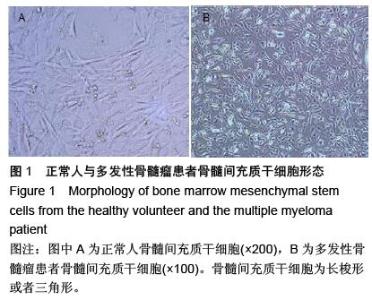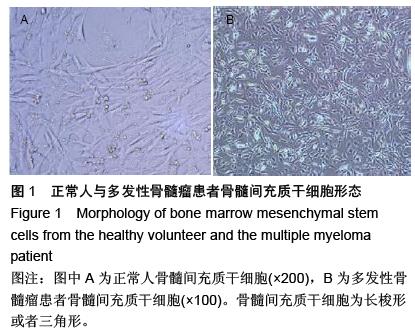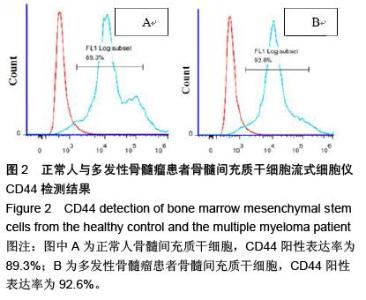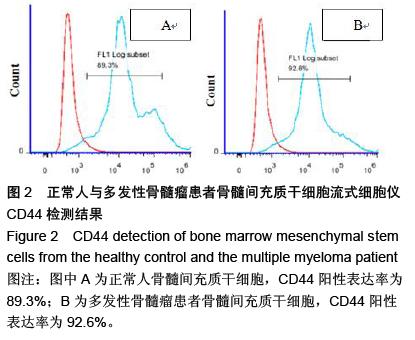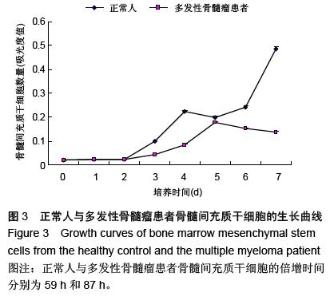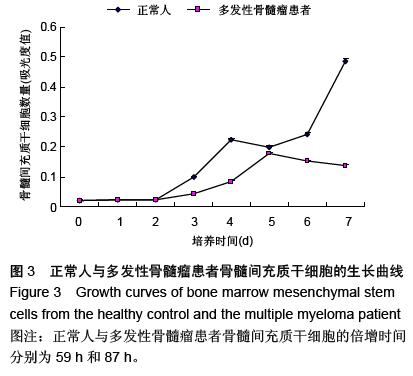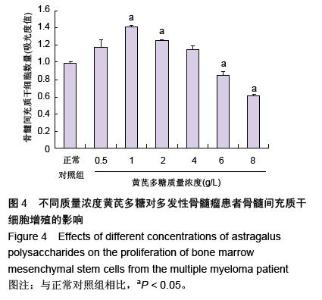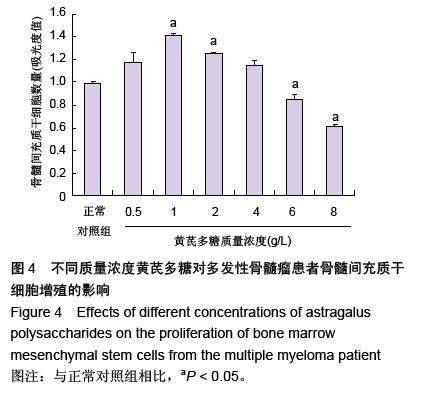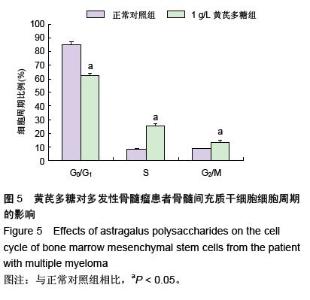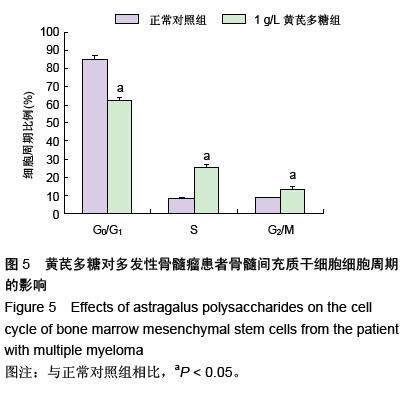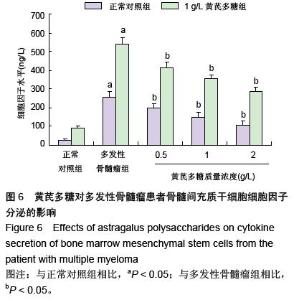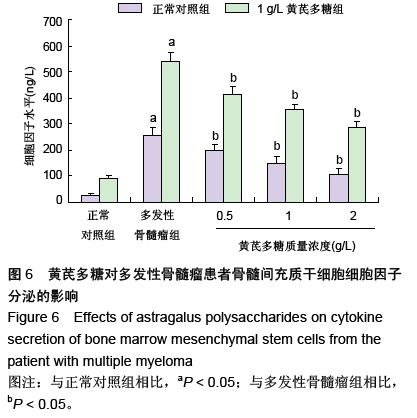| [1] 张建华,傅晋翔,张晓慧,等.破骨细胞在多发性骨髓瘤发病中的作用[J].中华血液学杂志,2007,28(5):323-326. [2] 王新生,崔慧先,李志鹏,等.黄芪诱导大鼠骨髓间充质干细胞向神经元样细胞分化的实验研究[J].中国老年学杂志, 2008,28(11):1067-1069. [3] Xu S, Menu E, De Becker A, et al. Bone marrow-derived mesenchymal stromal cells are attracted by multiple myeloma cell-produced chemokine CCL25 and favor myeloma cell growth in vitro and in vivo. Stem Cells. 2012;30(2):266-279. [4] Pennisi A, Ling W, Li X, et al. The ephrinB2/EphB4 axis is dysregulated in osteoprogenitors from myeloma patients and its activation affects myeloma bone disease and tumor growth. Blood. 2009;114(9):1803-1812. [5] He W, Mazumder A, Wilder T, et al. Adenosine regulates bone metabolism via A1, A2A, and A2B receptors in bone marrow cells from normal humans and patients with multiple myeloma. FASEB J. 2013;27(9):3446-3454. [6] 刘琳,白海,王存邦,等.黄芪多糖对多发性骨髓瘤患者骨髓间充质干细胞增殖与细胞因子表达的影响[J].现代生物医学进展,2013,13(10):1873-1877. [7] 沈文怡,陆化,唐宇宏,等.多发性骨髓瘤骨髓间充质干细胞多种细胞因子的异常表达[J].南京医科大学学报(自然科学版),2005,25(4):239-242. [8] 李香丽,张小影,臧立,等.骨髓间充质干细胞在多发性骨髓瘤活动与缓解期具有不同的促血管生成能力[J].中国组织工程研究,2014,18(37):5935-5941. [9] 林如峰,陆化,刘澎,等.蛋白酶体抑制剂PS-341对多发性骨髓瘤骨髓间充质干细胞多种细胞因子表达的影响[J].中国实验血液学杂志,2006,14(1):61-64. [10] 夏雷,杨姣,徐欣欣,等.FGFR2、MMP-1和CCL7在多发性骨髓瘤患者骨髓微环境中的表达及其临床意义[J].江苏医药,2014,40(12):1404-1406. [11] Zannettino AC, Paton S, Kortesidis A, et al. Human mulipotential mesenchymal/stromal stem cells are derived from a discrete subpopulation of STRO-1 bright/CD34 /CD45(-)/glycophorin-A-bone marrow cells. Haematologica. 2007;92(12):1707-1708. [12] Gunn WG, Krause U, Lee N, et al. Pharmaceutical inhibition of glycogen synthetase kinase-3β reduces multiple myeloma-induced bone disease in a novel murine plasmacytoma xenograft model. Blood. 2011; 117(5):1641-1651. [13] Pevsner-Fischer M, Levin S, Hammer-Topaz T, et al. Stable changes in mesenchymal stromal cells from multiple myeloma patients revealed through their responses to Toll-like receptor ligands and epidermal growth factor. Stem Cell Rev. 2012;8(2):343-354. [14] 雷艳花,陆益龙,朱伟,等.多发性骨髓瘤患者骨髓间充质干细胞体外生长特性和转化生长因子-β1基因的表达及其意义[J].白血病•淋巴瘤,2013,22(4):220-222,225. [15] 赵志华,赵智刚,陆宁,等.多发性骨髓瘤患者骨髓间充质干细胞的生物学特性研究[J].实用癌症杂志,2010,25(5): 441-444. [16] 王欢.骨髓瘤细胞对骨髓间充质干细胞成骨-破骨脱耦合因子影响的实验研究和小量同质骨髓标本流式细胞术检测在多发性骨髓瘤诊疗过程中作用[D].镇江:江苏大学,2012. [17] 陆化,李俊霞,李建勇,等.G130.多发性骨髓瘤患者骨髓间充质干细胞对骨髓瘤细胞趋化相关因子受体表达的影响[C]//中华医学会第十二次全国血液学学术会议论文集, 2012:423-423. [18] Xu S, De Becker A, De Raeve H, et al. In vitro expanded bone marrow-derived murine (C57Bl/KaLwRij) mesenchymal stem cells can acquire CD34 expression and induce sarcoma formation in vivo. Biochem Biophys Res Commun. 2012;424(3):391-397. [19] Li B, Shi M, Li J, et al. Elevated tumor necrosis factor-alpha suppresses TAZ expression and impairs osteogenic potential of Flk-1+ mesenchymal stem cells in patients with multiple myeloma. Stem Cells Dev. 2007;16(6):921-930. [20] Corre J, Labat E, Espagnolle N, et al. Bioactivity and prognostic significance of growth differentiation factor GDF15 secreted by bone marrow mesenchymal stem cells in multiple myeloma. Cancer Res. 2012;72(6): 1395-1406. [21] 王亚平.多发性骨髓瘤患者骨髓间充值干细胞向OB分化中的Runx2表达及体外造血机制[J].中国老年学杂志, 2014,34(5):1235-1237. [22] 张晓慧,孙谕,王子妍,等.骨髓间充质干细胞与多发性骨髓瘤细胞共培养后CX43表达及SDF-1α分泌水平的变化及其意义[J].中华血液学杂志,2013,34(9):788-793. [23] Noll JE, Williams SA, Tong CM, et al. Myeloma plasma cells alter the bone marrow microenvironment by stimulating the proliferation of mesenchymal stromal cells. Haematologica. 2014;99(1):163-171. [24] 王欢,陈曦,李静,等.骨髓基质细胞IL-1β、IL-6、SCF及TPO在老年多发性骨髓瘤组织中的表达及意义[J].现代生物医学进展,2014,14(36):7042-7044. |
